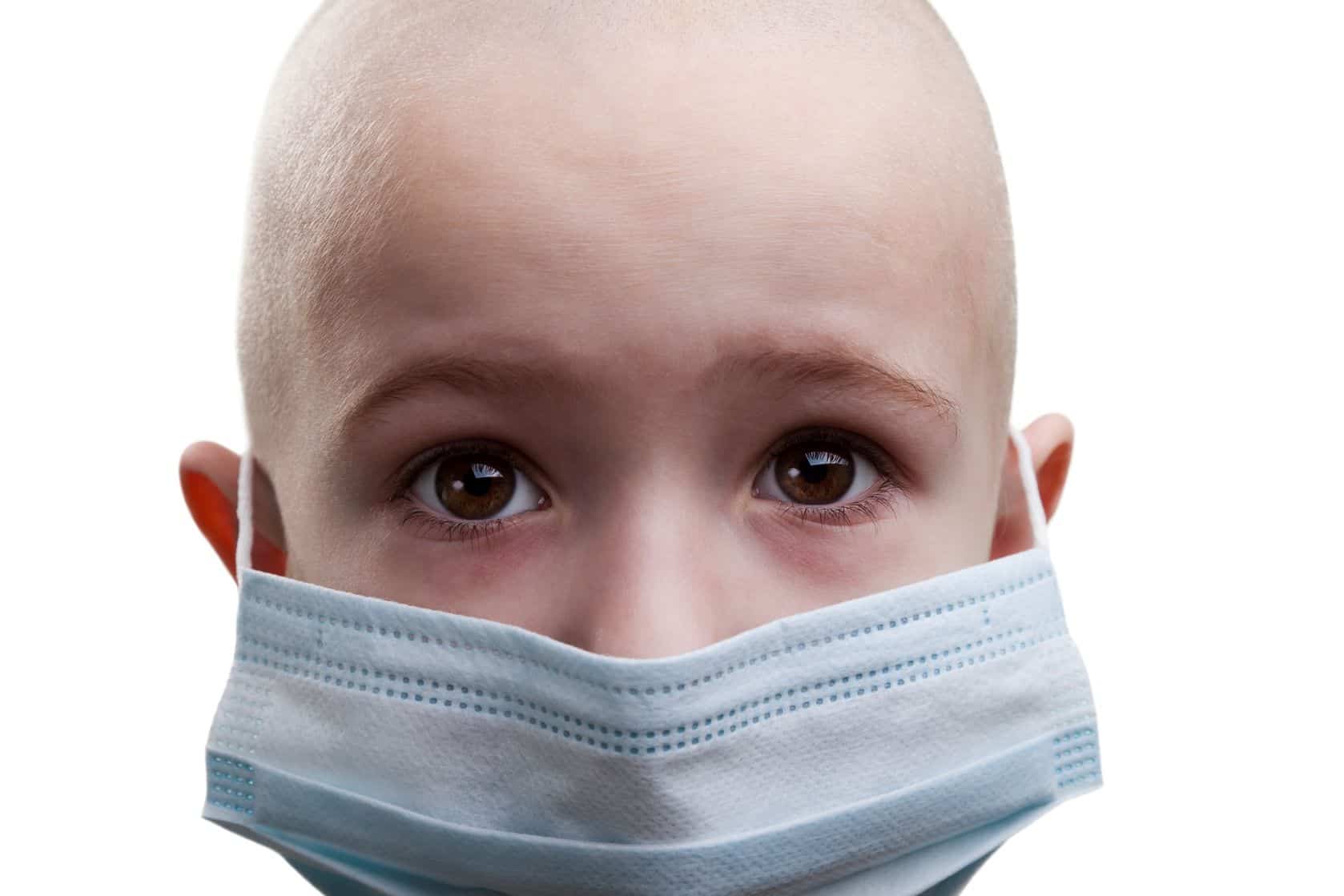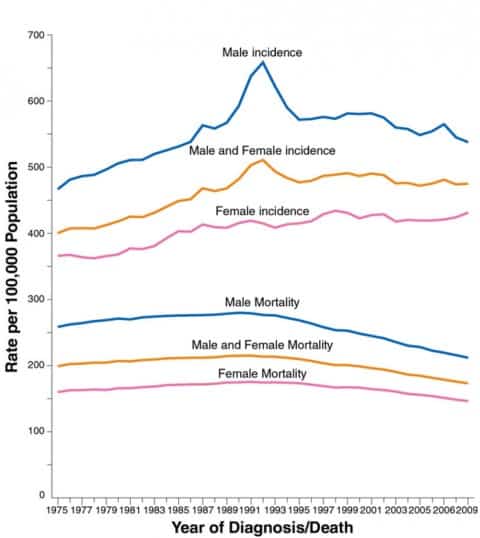A shocking new study shows how chemotherapy can make breast cancer worse…
Does chemotherapy even work? Learn the real truth about chemotherapy in this new article.
Scientists studying breast cancer found that several types of chemotherapy medication increases the chance of cancer cells migrating to other parts of the body. When cancer spreads it is almost always lethal.
Chemotherapy is usually given before surgery to help shrink the tumors which is does quite well in the short term. However it may actually allow tumors to grow back much stronger and also increase the number of doorways in blood vessels that allows cancer to spread.
The scientist behind the study, Dr George Karagiannis from New York, found the number of doorways was increased in 20 patients receiving two common chemotherapy drugs.
He also discovered that in mice, breast cancer chemotherapy increased the number of cancer cells circulating the body and in the lungs.
“In this study we only investigated chemotherapy-induced cancer cell dissemination in breast cancer. We are currently working on other types of cancer to see if similar effects are elicited.”
The study was published in the journal Science Translational Medicine.
Does Chemotherapy Even Work?
There is are many controversial headlines published online stating that chemotherapy does not work and actually kills people.
The conspiracy theories based on this study claim that Big Pharma is part of a grand scheme to cull the population and at the same time make trillions off the fact that chemotherapy can earn from $300K to $1 million per patient.
Is this really true?
They usually quote this study that found that curative and adjuvant cytotoxic chemotherapy to 5-year survival in adults was estimated to be 2.3% in Australia and 2.1% in the USA.
The conclusions of which are stated as:
As the 5-year relative survival rate for cancer in Australia is now over 60%, it is clear that cytotoxic chemotherapy only makes a minor contribution to cancer survival. To justify the continued funding and availability of drugs used in cytotoxic chemotherapy, a rigorous evaluation of the cost-effectiveness and impact on quality of life is urgently required.
Chemotherapy has a lot of risks and horrible side effects associated with it, so should we even be using it if it only contributes to a measely 2% of the overall effectiveness of cancer treatments?
On closer examination a different point of view emerges.
David Gorski from ScienceBasedMedicine.org makes a good attempt to debunk this study and many others used by alternative health sites to claim that chemo does not work.
Gorski makes that point that the quoted study is flawed in the fact it misses out some important data for types of cancer where chemotherapy is actually most effective.
‘It turns out that this is not such an impressive study. Indeed, it appears almost intentionally designed to have left out the very types of cancers for which chemotherapy provides the most benefit, and it uses 5 year survival exclusively, completely neglecting that in some common cancers (such as breast cancer) chemotherapy can prevent late relapses. There were also a lot of inconsistencies and omissions in that leukemias were not included, while leukemia is one type of cancer against which chemotherapy is most efficacious. ‘ David Gorski.
Even with this alternative view on conventional treatments by Gorski, it is still not very clear whether these treatments are that effective, especially if just used on their own without any other lifestyle changes or alternative treatments.
But are alternative news sites using the same tactics of misinforming the public by falsely representing statistics and data as the very establishment they are accusing of doing the same?
The government in the UK actually have a special law in place to protect the public from misleading claims made by companies advertising cancer cures.
The Cancer Act 1939
The Cancer Act 1939 was created to protect the public from snake oil salesman and false cancer cures that was rife in that time period. However it effectively gave a monopoly to the emerging radiotherapy industry that believed that radium was the only cure of cancer. As radium is so expensive to manufacture into a treatment, this law ensured that the government loan to the National Radium Trust (an independent non-governmental trust) would be secured by eliminating all competing cancer treatments.
It has since been changed many times, however this portion of the law still exists under the Medicines Act 1968, which prohibits the “advertising” of cancer treatments:
No person shall take any part in the publication of any advertisement containing an offer to treat any person for cancer, or to prescribe any remedy therefor, or to give any advice in connection with the treatment thereof;
Within the Act, only a select list are allowed access to information about alternative treatments.
- Members of the government
- Heads of hospitals
- Medical practitioners and practitioners in training
- Nurses
- Pharmacists
- Salesmen for surgical supplies
This is the route pharmaceutical companies use to advertise their next big blockbuster drugs, however real genuine alternative treatments will now rarely reach the public as it is simply too cost prohibitive to promote them under this act.
Similar versions of this act exists in different major countries across the world and is one of the main reasons why at present only conventional treatments such as radiotherapy, chemotherapy and surgery are choices available to cancer patients.
Is This The Shocking Truth About Cancer Research?
A very insightful article on the popular Reality Maps site reports:
“In a 2012 report in the scientific journal Nature (www.nature.com/nature/journal/v483/n7391/full/483531a.html) by Glenn Begley (former head of cancer research at Amgen) and Lee Ellis (surgical oncologist at MD Anderson), describes how 100 Amgen scientists [Amgen is a multinational biopharmaceutical company] could only replicate 6 of the results of 53 widely cited landmark cancer research papers.
This means that 47 (89%) of these important research papers, papers which influence how cancer is treated, may well be based on spurious research — they are bad science. And to make matters worse, some of the authors of research questioned by the Amgen scientists insisted on a confidentiality agreement preventing the investigating Amgen scientists from publicly disclosing data at odds with the original findings.
So these key cancer medical researchers not only know the spurious nature of their research, but they are quite prepared to cover it up, something which is against public interest because it ultimately costs lives — possibly a huge number. (Under any other name, this is mass murder, but under the conventional cancer treatment banner, this is business as usual.)”
How many other misleading research papers exist thanks to the interests of big business?
The Renegade Pharmacist’s Verdict
Cancer is very confusing. It is exceptionally hard to treat, especially in advanced stages. The staggering amount of differing viewpoints on which cancer treatments are effective is overwhelming too. It the murky world of cancer it is increasingly difficult to know who to trust for advice.
A member of my family was recently diagnosed with prostate cancer and had it surgically removed. Surgery was the recommended option by the consultant. However the distressing side effects of the surgery have meant that he frequently has to empty his bladder, and so his sleep is disturbed every night. His health had significantly deteriorated after the operation, however with my recommended lifestyle changes his mood and energy levels have somewhat stabilised.
If the cancer was more aggressive or had spread, he would no doubt of also had radiation therapy or chemotherapy.
My question is, after several decades of campaigning by cancer charities, billions invested into research by drug companies, why is it still only chemo, radiation and surgery the only treatments claimed to work against cancer?
Even though the reality is that none of these treatments are that effective at treating most types of cancer (a few types of cancer, and in some cases they are are fairly effective and can prolong life) and the side effects can sometime make life more unbearable than before treatment.
However the death rate from cancer is actually decreasing. In the US, it’s been decreasing for nearly the last 25 years, as shown in this graph from the most recent American Cancer Society statistics:
According to Gorski, chemotherapy makes up a significant part of the reason for this decline. But is he taking into account the fact more people are becoming aware of alternative treatments, healthier lifestyles and supplements. Could this decline be more to do with people learning how to change their lifestyles and habits, and the fact the internet has allowed this information to spread?
Should the government stop trying to protect the public, especially when they are proven time and time again to be completely incompetent at it (e.g perpetuating the saturated fats cause heart disease myth) and completely repeal the outdated Cancer Act 1939?
The very fact laws exist that allows big business to fund lobbyists and even medical research makes it much harder to trust the government on these matters too, and in turn makes it even harder to trust the studies that come out.
If the government want to win back the trust of the people, they really need to take a look at the laws they make, the old ones that still exist, and whether they still serve the interests of the people.
The sheer magnitude of money to be made and the lack of cohesion between big pharmaceutical companies and alternative health companies creates an environment for hostile competition rather than conscious collaboration.
I am also so tired with the fact it is so hard now to trust scientific research and the reporting of it. Especially mainstream media who now love to cherry pick for more clicks.
I believe a lot of the problem is to do with the sheer cost of doing proper clinical trials. This means they are usually funded by people with commercial interests that creates a bias in the reporting of data.
Surely there has to be another safer way?
I believe to treat cancer it must be a holistic approach taking into account many different lifestyle factors. Conventional treatment should be a last resort, and only used in emergency situations like if a cancer is particularly aggressive, however it can clearly save lives in certain cases and so should not be ruled out.
There is no one size fits all approach to cancer and most likely not a single drug or potion is going to work miracles.
The best thing you can do in my opinion if you are suffering from cancer at the moment is to find people who have successfully healed themselves or others from the type of cancer you are suffering from, then simply model and tweak what they did for your own situation.
If you want access to a very good resource of information about all the alternative treatments that do exist, my friend Ty Bollinger has interviewed many physicians, functional doctors, and alternative healthcare professionals from around the world who have many success stories at treating cancer.






This is a good article, good source of information. Much more balanced that what I usually find from the mainstream medical community. To me, the glaring thing that demonstrates that the Medical Establishment is more focused on profits and how to maximize them is the fact that after all these years of research and study, the same treatments that were deemed the best in 1950 are still the ones that are deemed the best in 2018.
Either the researchers are unwilling, or unable to find better treatments. In either case, they are not deserving of the research money, accolades and leadership in the cancer research arena. If you study the history of the AMA and Big Pharma, it becomes obvious that it is a cartel that has a goal of maximizing profits, and ruthlessly destroying any competition that may arise. And they do it with a cold, calculating, persistent efficiency. But the word is getting out about the effectiveness of treatments that are cheaper and non-toxic. The truth cannot be suppressed forever.
My names are HARRY MARY I’m a citizen of United Kingdom, My younger sister was sicking of breast cancer and her name is HARRY Sandra I and my family have taking her to all kind of hospital in UK still yet no good result. I decided to go to the internet and search for cancer cure so that was how I find a lady called peter Lizzy she was testifies to the world about the goodness of a herbal man who has the root and half to cure all kind of disease and the herbal man email was there. So I decided to contact the herbal man for my younger sister help to cure her breast cancer. I contacted him and told him my problem he told me that I should not worry that my sister cancer will be cure, he told me that there is a medicine that he is going to give me that I will cook it and give it to my sister to drink for one week, so I ask how can I receive the cure that I am in UK, he told me that I will pay for the delivery service. The courier service can transport it to me so he told me the amount I will pay, so my dad paid for the delivery fee. two days later I receive the cure from the courier service so I used it as the herbal man instructed me to, before the week complete my sister cancer was healed and it was like a dream to me not knowing that it was physical I and my family were very happy about the miracle of Doctor so my dad wanted to pay him 5 million us dollars the herbal man did not accept the offer from my dad, but I don’t know why he didn’t accept the offer, he only say that I should tell the world about him and his miracle he perform so am now here to tell the world about him if you or your relative is having any kind of disease that you can’t get from the hospital please contact [email protected] or call him and whatsApp him he will help you out with the problem.
fake reviews do not make good medicine- it makes you look like another get rich quack. If you have the evidence that it works rely on that evidence and not made up, badly written testimony from made up people.